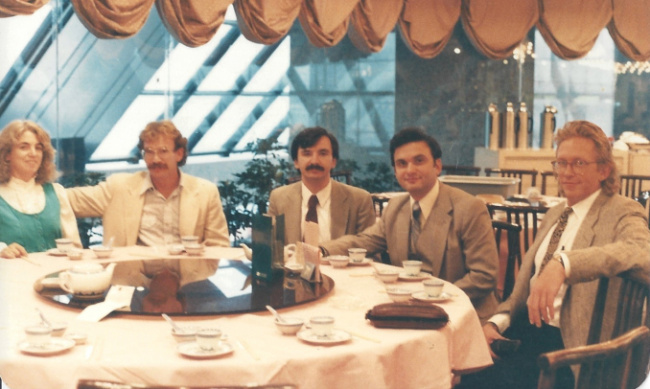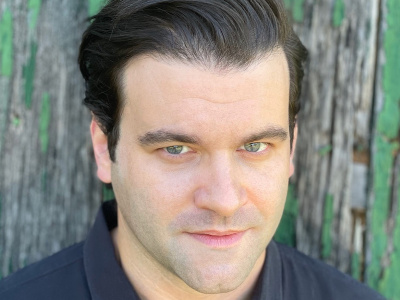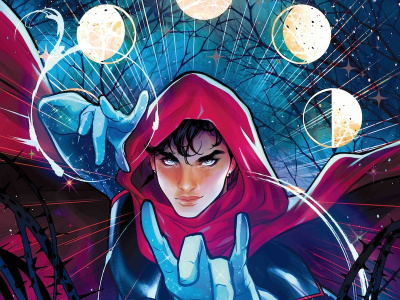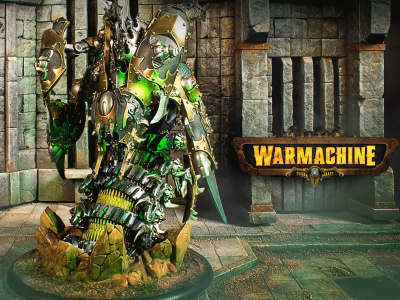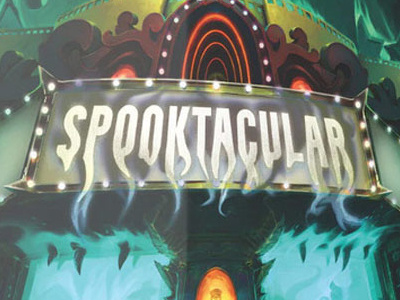Steve Geppi is the CEO of Diamond Comics Distributors and its parent company, Geppi Family Enterprises a company that grew from a tiny back-issue store to a major force in the comics industry. From 1993 to 2020, Diamond was the sole distributor to the Direct Market. For ICv2's Comics Direct Market 50th Anniversary celebration, historian Dan Gearino, author of Comic Shop: The Retail Mavericks Who Gave Us a New Geek Culture, talks to Geppi about his years in the business. In Part 2, Geppi discusses the growth of Diamond and how it weathered the market bust of the 1990s. Part 1 covers Geppi’s early days selling back issues in a tiny comic shop and how he moved from that to being a distributor. In Part 3, he looks at the realities of the Direct Market today and Diamond’s place in it.
For an overview article on the history of Diamond Comic Distributors, see "Origins, Dominance and Now a 'Gut Punch': The Story of Diamond."
This interview was conducted as part of ICv2's Comics Direct Market 50th Anniversary celebration; for more, see "Comics Direct Market 50th Anniversary."
To watch a video of this interview, see "ICv2 Video Interview: Steve Geppi – Part 2."
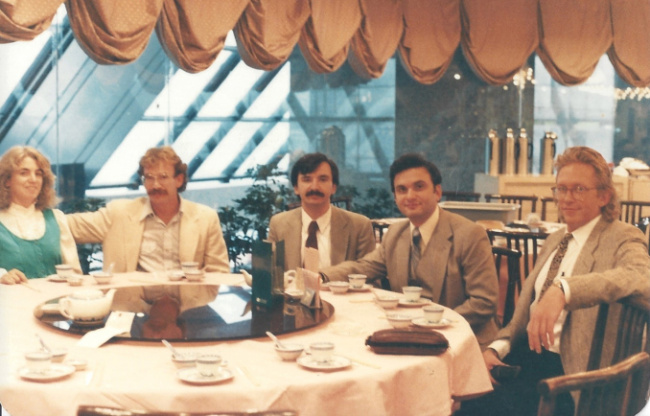
1984 sticks in my mind. It was definitely '80s. I think '84. Bill and his wife Cindy moved to the East Coast. I knew his father, knew his mother. He had had Pacific Comics. Look at the pioneer Bill was. Jack Kirby would have attested. He was the first with Captain Victory. That was one of the first times they gave rights to a creator, and Bill played a significant role.
I think he was more well‑known than I was. Maybe not on the East Coast because I had presence there. Certainly, Bill was a known entity because he was a publisher, distributor, and a retailer, which, technically, I had become too.
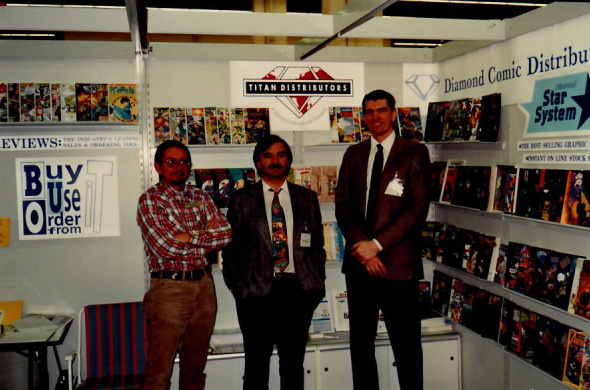
I'll never forget, when he was in a little bit of a dispute with Dave Sim, he signed it as the national account representative. Dave, being facetious, said, "Dear National Accounts Representative." [laughs] He was taking a shot. Bill, because he had thick skin, he took it in stride. Dave and I are friends now. It was just part of the evolution.
Remember, Diamond was just forming, and this whole concept of developing an order form called Previews, while Capital was doing Advance Comics, we were doing Previews. Everybody was doing their version. Bill became a magnet for a lot of things. He was very instrumental in the birth of Diamond Select Toys.
He ultimately became the Vice President of Purchasing. He was on the upper management team, as we call it, so Bill's tentacles were involved in a lot of what Diamond did, on a lot of levels. Larry and Chuck were primarily dealing with the finance and direction and operation of the company. Bill was more related to dealing with publishers. Retailers too, but more so publishers for Bill. He was the guy you called when you wanted Diamond to carry your product. He was the guy that negotiated the deal, etc. and actually took a lot of heat, which is a tough job, to say the least. Bill was very, very important, very instrumental, for the many, many years he was there. I'll always owe a debt of gratitude to him.
I wonder, when you say "Taking a lot of heat," I think what you're touching on is there was a time where there was criticism in the industry of Diamond not wanting to distribute material aimed specifically at adults, basically. I presume that came from you. It wasn't just Bill.
It did come from me. Bill probably took the hit in a lot of cases because he had to say that to people. We created something, it's funny to look back, we called it "Cautionary Comics." It was the first break in the dam. It wasn't even necessarily always about content from the standpoint of sex or violence or anything like that. I felt like if you were to call one of the national distributors and you were a kid in college and you had a scratch pad and you drew two stick men and said, "I want to be distributed," I think you'd have a hard time getting them to distribute it.
Call it censorship, but it really was more protection, I thought, in my mind, for what it's worth, of making sure that what I did offer at least met the standard of it looked professional. That's subjective, for me to be the guy to judge that.
I'll always admit that we had a drawer called "The ones that never got to the Diamond order form," and in there (I hate to say it, big faux pas) was Teenage Mutant Ninja Turtles. [laughs] I had no clue. With my apologies to Laird and Eastman, who knew that that would turn out to be what it was. I made a lot of blunders. I'm trying to get away from that.
It got singled out as all about sex because I made a comment about Miracleman #1. I was a father with kids, and here's a girl with her legs spread wide open, giving birth. I'm thinking, "I don't want my kids to find out about the birds and the bees this way." I caught a lot of heat for that. There was Omaha the Cat Dancer, and then there was Puma Blues. I could go on.
So we created something called Cautionary Comics. We covered our butt. We would say, "These are titles that you might want to look a little harder at. We're not promising you that they're going to be super professional, super well‑drawn, super well‑written. In addition to that, if you have laws in your state or area that restrict you from carrying certain types of material,” which there are, "or your landlord might give you a hard time over it, we're still going to offer it to you, but be aware we told you."
Ultimately I caved, I guess you would say, and we started carrying everything under the sun, took the position that it's everybody's choice, I'll stop being the so‑called censor. As you can see from Previews, now, we carry everything under the sun. I still have my own personal views about things, but that's my personal views. I don't want to prevent a retailer from being able to buy what they want.
One of the problems we have, Dan, is these things happened so long ago that people who weren't there that are a big part of our industry today don't even know the real stories. There are people who think we created exclusivity. Anybody who's been around long enough to know knows that's not what happened. Marvel defected and bought Heroes World, and then DC decided they didn't want to buy a distributor. They would rather have control over one distributor and even had an option on my company to buy it, which never happened.
Nonetheless, that's how exclusivity occurred. Before that, it was 20 distributors and free for all. We all carry all the products. For the benefit of those who might be listening or watching, please know that the evil Steve Geppi, didn't create exclusivity. He, no doubt, benefited from it, so I guess I have distributor privilege, would you call that? [laughs]
That's a nice segue. Let's talk about what the market was like right before the Heroes World fiasco. Let's say six months to a year out from that, before Marvel decides to blow up the market in the mid‑'90s—they self‑distributed, essentially—were things pretty good, then? There was a boom time that was fading into a bust at about that time, right?
We're talking '93‑ish?
Yeah.
What Marvel did was like '95‑ish. What happened was, for what it's worth, my version of the implosion that happened, in '93, particularly, we had The Death of Superman, and it was a phenomenon that benefited everybody. Everybody was going to the comic stores, not just to buy Superman. They were buying more Marvels, buying more everything. But it was exacerbated by the baseball card market, who had kind of ruined that market with overproduction and people buying cases of cards. Doctors, lawyers putting them under the bed, hoping they're going to put the kids through college. It was all a bogus market.
When that fell on its face in the card market, they migrated to the comic market. At that time, you could ask any distributor who was distributing, almost every one of our accounts was at top discount because they were ordering cases of these books. I think Superman had seven tractor‑trailer loads. It was some ridiculous number. The people buying into that same theory, supply/demand didn't even apply in their mind. They didn't realize these things are going to always be around in large quantities.
I'll give you numbers. In 1993, Diamond was 44% of the direct market as calculated by the way the publishers divvied up limited editions. We were 44%. We were the largest distributor since '88. We did $222 million that year as 44%. Two years later, when we're for all intents and purposes the only game in town, Marvel comes back, we're doing $168 million with 100% or almost 100% of the market. It's like the industry imploded, half‑sized.
This is why exclusivity happened, because there wasn't enough volume to justify 20 distributors. Retailers wanted the same thing from their distributor as the other guy got from his distributor. If you happen to be, in a ridiculous analogy, directly across the street from another guy, he bought from this distributor, and the other one, from another distributor. He didn't care what your size was. He needed the services you could afford to give on your volume that he couldn't. That's what caused the pain, so to speak.
We've been through so many things. Before that, when I was at 20th Street, we went through the air freight wars. You know what it tells you, though, Dan, is the resilience of this industry. The inherent—I don't know how I want to say it. It's the inherent sustainability that it has. Despite all the things that were going to replace comics over all the 80 years we've watched (television will replace radio, and then you have digital comic stores), the great thing about comics is they always partner with all those new technologies and they make it work for them and they survive.
We have our ups and downs. Look, we just went through COVID where we had a boom. People were home more often, reading. Aside from the beginning, the shutdown.
Of course, what happened, particularly, in the back issue market, if you were going on an auction, we all know that auctions depend on who's at the switch at the time of the auction. Just because something doesn't sell for a big price that night doesn't mean it's not worth more. It just means the guy that was going to pay more, who would have tangoed, wasn't there. When COVID hit, everybody was home. Prices went through the roof. It's come down a little bit. The good thing is no matter when we've had an up or a down, it seems to always rebound and go back in the right direction.
The reason I bring up the collectible market, it is what started the direct market. The desire to buy old comics, back issues, having a place to go. More so than just the availability, it was the clubhouse. You get to go talk to a guy who knows about comics. He's the owner or the clerk. Moreover, you get to talk to fellow fans, because at your house, you're probably considered the geek. You're the oddball that still collects comics. Now, you go to the store, you get your fix. You get your new comics, you check out the back issues, and there's a new buddy there that you just met. You become great friends because he knows all the things you're going through and relates to him 1,000 percent. That's what's so special about this industry.
You've told the story of the Heroes World and its aftermath many times. You and I talked about this before, so we don't need to rehash the whole thing. I'm wondering, was there a point in there where you thought Diamond was not going to make it, where your business was at risk?
Various part of Diamond's tenure was when everybody had the scary part. That was when Marvel defected. Everybody was losing Marvel. That was pretty much 33% to 35% of our businesses.
We had experienced the boom. When Perelman owned Marvel, they exhausted every means possible to inflate the stock. Holographic covers, everything was production, production. Of course, that house of cards eventually felt the pain when it collapsed.
I've always been an optimistic person. In 1993, when all of this was developing (thereafter, '93, '94, '95), I have to say, I was concerned. I always felt, presumptuous or not, I would make it somehow, somewhere, someway. Remember, I started with back issues, and I always loved that.
Maybe, if I were selfish and said, "Screw all my employees, I'll still sell back issues. I'll make a living." But I wasn't that guy. I was worried about the employees. I was worried about the industry. I thought, "What can I do?" I didn't know for sure I was going to get the exclusive from DC. I had to be prepared. I opened up a couple little companies. I had Gemstone, I bought the price guide, I did a bunch of other little things to give me something to fall back on, potentially.
When DC gave us the exclusive and that became a known thing, not an unknown or hopeful thing, it gave us a building block to start again. As I demonstrated by the numbers, even though we got all of DC, with the industry half‑sizing, we were still less than we were at 44%. We still had to work hard.
Then, subsequently, things started to come together, and I presumptuously, egotistically think we played a pretty good part in helping build it because Diamond went back up to a 500‑and‑some million dollar company not long thereafter.
Exclusivity, it's easy for me to say how great it would be if you're the only guy that has it, but it really wasn't about greed. It was about necessity. The industry shrunk to a point where you couldn't afford 20 distributors. Keep in mind, a lot of our retailers are mom‑and‑pop stores that work hard, passionately, endless hours, to not make, in some cases, a lot of money. We needed the industry to survive. Aside from ourselves, a lot of people would go under if we did not survive.
The industry, by osmosis or whatever, I got duly elected, I don't know how, to be the one remaining. We tried to do our best to be good stewards and make sure that the industry did survive. And survive it did for a long, long time, and it’s still surviving. Now, COVID came along and made some changes. We have to live with that, and if the world becomes non‑exclusive, I'm happy to play in that arena. I was in it once before when there were 20 distributors. I always feel like I'm a good competitor. We're not perfect. We make mistakes. We get blamed for a lot of things. I sometimes think we should rename the San Andreas Fault "Diamond." [laughs] It's our fault. A lot of complaints are totally legitimate. We screw up a lot too, but we're human, and we try to fix it. We're not sitting in a room one day saying, oh, boy, let's see how we can screw the retailers and the publishers over. If anybody thinks that, they're losing their mind. We do everything we can. When you suddenly have competition that maybe you didn't have before, even when I was supposedly the only game in town, I still felt leveraged by the publishers no matter what.
Let's say, now, there's other distributors, there’s Lunar, there’s PRH, places like that and the book market becomes a big part, so you've got Random House, you've got Simon & Schuster, God bless ‘em, we're all part of the industry.
There's this period between when Marvel leaves Heroes World, the period where you are absolutely dominating the market, and it goes on for a long time. But during that time, you're also developing other businesses. If we go from, let’s say, when Diamond bought Capital City, to COVID, so that period, however many years that was, what were you doing? A lot happened during that. There were lots of ups and downs. When you look at that, I think when we look at the history of the business, it can seem like, "Oh, that's just one chapter," but it's like there's 20 chapters in there. What are the things that jump out to you about what was important during that time?
During that period, when we bought Capital, that was like '95 or whatever year it was. It was a two-distributor world per se. Capital went from (correct the numbers, I'm not sure, Milton could verify) a $150 million company with 20 warehouses to a $50 million company with one warehouse.
To their credit, they hung on valiantly and did a lot of adjustments that needed to be done and probably could have survived anyway. I got the call from those guys, which I'm sure was not an easy call to make. I always felt that despite competition, we were friendly.
Pretty much how I bought all the other distributors over the years. I always had at least an appearance of trust that if you had to go to somebody that was your competitor, Steve was the guy that would treat you the best. I had good testimonies from Bill, Bud Plant, and others that these guys acknowledge.
I got one of the nicest letters ever (that I still have) from Milton after the deal. Sometime after the deal, just commended me, documented everything, Bud had told him exactly what would happen. It was totally a very nice letter to get from a guy who was your competitor.
What happened was our industry was, even before then and even now, to a certain degree, fragile financially. It wasn't built on multimillion dollar companies with deep war chests. The concern from my perspective, whether true or not, was that if I played the hard ass and said, "Let them die on the vine." They may never have died on the vine. I never take that for granted. Those guys are too competitive. They would have probably survived. In my mind, if they didn't, it would be a catastrophe for the industry. Because while you might argue, "Gee, Steve, why would you care? You'll get all the business, right?" No, because a lot of publishers potentially would not get paid, and that would hurt me too. We cut a deal where those guys came away whole and more than whole, happy to the degree you can be in that circumstance.
Milton went on to form ICv2 and has been a major player in the industry, one of the best analysts we have, and we've remained friends. That period was not to be compared with when Marvel left. Because this was more the aftermath of this because we had to, remember, I mentioned the half sizing of the industry and it certainly couldn't afford 20, but it was getting to the point where it couldn't afford two.
There was consolidation and discounts were never good. For the years that we've been in business (this is a tough business to be in as a distributor) we have never had an increase in margin. Ever. If anything, it's been decreased.
People bought at 60% off non‑returnable when we started, then it shipped at the brokerages and percentages were laid out, and they've never gotten more. Costs went up, labor went up, volumes went down, a million things happened. It's really hard to survive as a distributor on any level.
Now we're back to dividing that volume and it hurts. It hurts to have part of your vision go here, look, we've lost all of DC, except for the UK, to Lunar. In Marvel's case, we have retained a decent percentage of the business, despite the fact we're at a major disadvantage on discount.
Image just recently left us. We still sell Image though, thankfully to those guys for keeping us in the game, a la Marvel and PRH. Dark Horse, IDW, same thing. Diamond UK is the only one that’s really been, in theory, not affected. They never lost Marvel. They never lost DC. They've been treated almost like another guy's company that happens to be me in this case, because the important thing about Diamond, you have to have a physical warehouse there, and that's really hard to compete with from the States.
More to your point, I drifted there, in that period you might think, "Gee, hallelujah. My biggest competitor for 15 years is going away. Wow, this is great." There's some initial jubilation about getting more volume. Anyone would like to get more volume. But to quote Stan Lee, with great power comes great responsibility. It suddenly became even more of a focus of what the weight of the industry was on me personally. Because any decision I make would be felt by a lot of people.
On one hand, when you're that guy or that company, you get all the credit for what's right. Referring back to my San Andreas fault analogy, you get all the blame for what goes wrong. Much of it is deserved, but not all. There's a balance between that.
We've tried to walk the steady road. I don't think we ever became complacent, but I imagine people felt that because, when you don't have a choice of who to buy from, you start to think that your distributor’s being complacent, which could happen.
Maybe it's a good thing that people get to experience choice again. Keep in mind, we never created the no‑choice scenario. That was a product of the industry's shrinkage. We just happened to be—somebody had to be surviving.
Now, with choices (albeit a different kind of a choice), we know that the benefits of one distributor are lost. There's a lot more work for a retailer. You have to get the shipments multiple times a week. The freight costs go up.
There's a lot of things that happen that in the benevolent dictator world wouldn't have happened. I like to think I was benevolent, though some may hate me and think I wasn't. I truly believe that when we did these things, a lot of it was common sense. You can only afford to do this. You don't have an option of creating, especially, in a distributor world (not to cry poor mouth about a distributor) when you never get an increase in your discount, and your freight costs go up, your labor goes up, retailers want bigger discounts, more services, it's got to come from somewhere.
We continued to feel that and survive, because the volume was growing. Now, volume is not growing like it was. I'm talking about the industry. I'm not talking about Diamond. The book market has been the savior, in a sense, because they had been growing at a better rate than what the comic store market has seen themselves.
Then the diversification came. We started carrying toys, started carrying merch. All these things gave retailers more to sell, whether it be comics or something else. This nucleus, this little market called the Direct Market, these specialty stores are different than what they were back in the day.
Four or five years ago, I was invited to be the guest keynote speaker at the C2E2, and it was funny. I started off by saying "You might find this would be counterintuitive for me to give this speech, but I was entreating retailers to get more involved in back issues, even though you could argue it was counterintuitive for me. The more space they devoted to new product, the more I benefited."
We all knew that even back in the 70s and 80s, how much space back issues took up, let alone 40 years later when it was 40 years of backlog. What's come to fruition in recent years is a lot of stores are creating online ability to sell back issues.
The reason I said that was because retail is what it is, discounts can be bigger. For the sake of ease of math, let's say, keystone markup is 50 percent, you buy at 50 off. Well, to a consumer, "Man, he's making double his money." They have no clue how much work and rent and insurance and labor, everything, goes into that. They've already got a tough row to hoe. A distributor can only give so much with his discount or brokerage fee.
So what happens is they need other products that they have better margin on, and the only thing that works that way for a retailer in the comic industry is back issues, because you have the potential to buy some very cheap and get great markup. That will help you subsidize your overhead, your rent.
Even a store that was 3,000 square feet that I could fill tomorrow morning three times over with new product, I was hoping they would at least have some ability (whatever how they choose to do it, whether it be online or otherwise) to sell back issues. That's been proven to be a savior in recent years.
That's the way I started out. I didn't even want new comics. They were, to me, a nuisance. Forty percent off, two months in advance. You pay for the third order before you even get the first. They were non‑returnable. You had to order in increments of 25. Do you know how many nights I cried over House of Mystery ordering 26, because my guys wanted their copies? Who do I short? I ain't ordering 50. [laughs] These are the little things that if you weren't there, they may sound like stupid little anecdotes. Trust me, they were important at the time.
Click here for Part 3.



